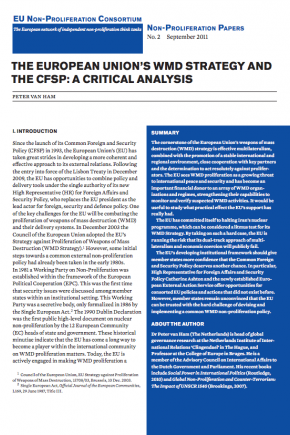The European Union’s WMD Strategy and the CFSP: A Critical Analysis
The cornerstone of the European Union’s weapons of mass destruction (WMD) strategy is effective multilateralism, combined with the promotion of a stable international and regional environment, close cooperation with key partners and the determination to act resolutely against proliferators. The EU sees WMD proliferation as a growing threat to international peace and security and has become an import ant financial donor to an array of WMD organizations and regimes, strengthening their capabilities to monitor and verify suspected WMD activities. It would be useful to study what practical effect the EU’s support has really had. The EU has committed itself to halting Iran’s nuclear pro gramme, which can be considered a litmus test for its WMD Strategy. By taking on such a hard case, the EU is running the risk that its dual-track approach of multilateralism and economic coercion will publicly fail. The EU’s developing institutional framework should give member states more confidence that the Common Foreign and Security Policy deserves another chance. In particular, High Representative for Foreign Affairs and Security Policy Catherine Ashton and the newly established European External Action Service offer opportunities for consorted EU policies and actions that did not exist before. However, member states remain unconvinced that the EU can be trusted with the hard challenge of devising and implementing a common WMD non-proliferation policy.

